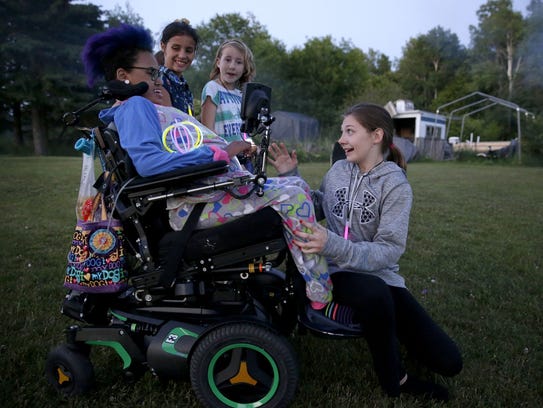
This article is more than
9 year oldAPPLETON, Wis. — Disability rights groups are attempting to intervene in an Appleton teenager’s decision to cease medical treatment and die of the incurable disease that has racked her body and left her in constant pain.
Carrie Ann Lucas, executive director of the Colorado-based Disabled Parents Rights, said her organization is one of several that have asked for child-protection authorities to investigate the case of 14-year-old Jerika Bolen, whose decision to enter hospice care at the end of summer gained national attention.
“A child doesn’t have the capacity to make those types of decisions, and under the eyes of the law, this is a child,” Lucas said Tuesday.
Jerika suffers from Spinal Muscular Atrophy Type 2. She and her mother, Jen Bolen, said earlier this summer that Jerika would go without her ventilator while under hospice care in early September, essentially scheduling her own death. Her story drew an outpouring of support when her family, friends and her care team held a prom, dubbed Jerika's Last Dance, in late July.
On Tuesday, Jen Bolen asked for privacy and declined further comment about her daughter's medical care.
Melissa Blom, director of Outagamie County’s Children, Youth and Families Division, also declined comment on whether her office has received a referral or opened an investigation, citing the confidentiality of child-welfare cases.

Jerika was diagnosed as a baby with Spinal Muscular Atrophy, often referred to as SMA. The incurable disease destroys nerve cells in the brain stem and spinal cord that control voluntary muscle activity. Jerika has never walked, and today her movement is mostly limited to her head and hands.
Jerika said she’s in constant pain — about a seven on a scale of one to 10 on her best days. She expressed concern that her pain and the need for more invasive medical interventions would grow as her body continues to deteriorate.
Lucas, who said she is unaware of whether a child-protection investigation has commenced, said her organization is not asking that Jerika be removed from her mother’s care.
“Foster care will not solve this problem,” she said.
But Jerika is in need of mental health care, not additional support for ending her life, Lucas said.
Lucas said four organizations sent a joint letter to the Wisconsin Department of Children and Families asking for intervention, and she followed up with a phone call to Outagamie County's Children, Youth and Families Division. The other organizations are Not Dead Yet, NMD United and the Autistic Self Advocacy Network, Lucas said.
Debate began to bubble as many reached out to celebrate Jerika's life in July. More than a 1,000 people arrived at a prom thrown in Jerika's honor as a last wish. Police and firefighters provided a motorcade. She received cards and gifts from around the world and shout-outs from a number of celebrities.
But her decision also drew pleas that she change her mind, including from adults with Spinal Muscular Atrophy.
Jen Bolen, in a July interview, said those critical of Jerika's decision fail to understand the depth of medical intervention it’s taken for her to reach her teenage years.
"I was fighting for my kid," she said. "I never thought I'd be on this side of things."
Lucas, meanwhile, said Jerika's decision — and the support she's received — is an important issue to the disability rights community. Those with disabilities have equal rights to child protection, which includes efforts to ensure parents are acting in their children’s best interests, she said.
Though Jerika's disease is progressive, it isn’t “acutely terminal,” Lucas said, and she questions whether simply withholding treatment would be sufficient to end her life quickly.
When it’s a decision of death, “it’s never in the child’s best interests,” Lucas argued.
Jerika’s story is far from the first time end-of-life decisions have drawn controversy.
Perhaps the most famous case was that of Terri Schiavo, a brain-damaged Florida woman who was taken off of life support in 2005 after a family battle and a national debate over decision-making authority.
Diane Coleman, executive director of the anti-euthanasia organization Not Dead Yet, compared the Bolens’ situation to that of Julianna Snow, a 5-year-old Oregon girl who was given the choice by her parents on whether to continue medical treatment.
Snow, who had an incurable neurodegenerative illness, chose against further hospitalization and died in June after spending 18 months in hospice care.
Coleman questioned both cases based on their ages. But her organization views euthanasia as a form of discrimination against the old, ill and disabled.
“I worry that there’s an attitude in the health care profession that really writes people off with disabilities,” she said. “I worry that people like Jerika and Julianna are in the throes of that, and without adequate support.”
The withholding of treatment from the disabled was recently subject of court scrutiny in Wisconsin based on a lawsuit brought by the Disability Rights Wisconsin organization.
In 2009, the organization sued five doctors from UW Health over their withholding of treatment from two developmentally disabled patients, including a 13-year-old boy they had placed in hospice care. Lawyers argued the boy would have recovered from pneumonia.
The case was dismissed at the circuit court level, and in 2014, the Wisconsin Court of Appeals upheld that decision, putting an end to the lawsuit.

Attorneys for Disability Rights Wisconsin argued “parents had no right to direct the withholding or withdrawal of life-sustaining medical treatment to their children who are not in (a persistent vegetative state.)”
The court rejected the organization's arguments that withholding of care violated the patients' due process rights.
Lisa Pugh, public policy director for Disability Rights Wisconsin, couldn’t be reached for comment on Tuesday.
Follow Jim Collar on Twitter: @JimCollar